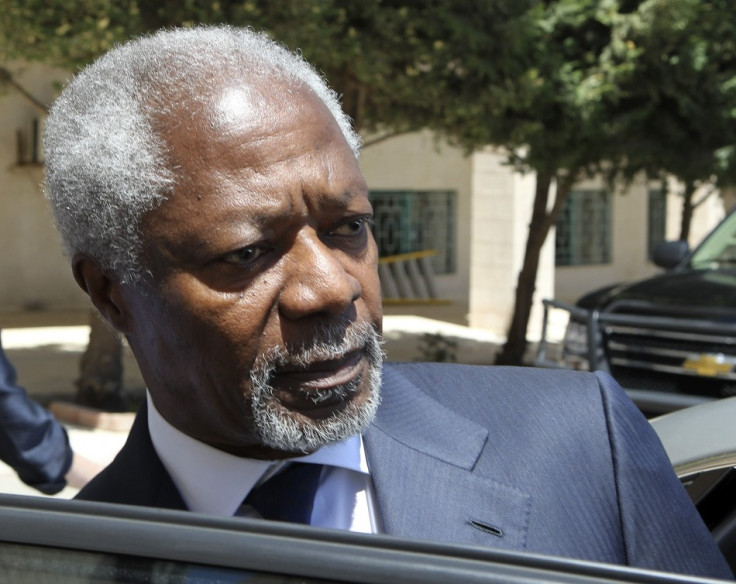Syria: Kofi Annan Urges Global Community to Support Plan despite New Massacre
With his peace plan in tatters and reports of fresh slaughter in central province of Hama, peace envoy addresses UN in New York

With a Syria peace plan in tatters and a new massacre in the central province of Hama, Kofi Annan has addressed the UN in New York.
Annan, the joint special envoy of the United Nations and the League of Arab States, told the general assembly that he had been given a tough job when he was asked to come up with a plan that would stop the violence in Syria.
After an upsurge in the killings and at least two massacres in the space of two weeks, Annan said: "I confirm that the plan is not being implemented. "
He called on those responsible for the massacres in Houla on 25 May to be held responsible and expressed his "horror and condemnation" at reports of a second massacre, in al-Kubeir in Hama, in which at least 78 people were killed.
UN Syria observers shot near al-Kubeir
UN Secretary-General Ban Ki-Moon said UN observers who were trying to access the village of al-Kubeir, had been shot by small-arm fire but did not provide further details.
UN monitors team were blocked from getting into the area by Syrian troops, the head of the monitoring team said. Gen Robert Mood said some UN patrols were also stopped by civilians in the area, who were worried about reprisals.
The Syrian government issued a statement on state TV denying troops had blocked access to al-Kubeir. It also blamed the bloodshed on terrorists and criticised the 'baseless accusations' levelled by some media.
"The concerned authorities clashed with the terrorists, killing them and confiscating their weapons which included RPG launchers, machine guns and hand grenades," it said in a televised statement.
The Syrian government accounts of the attack stands in stark contrast to that of the survivors of the massacre who told activists most of the bodies were executed, had been stabbed or burnt. Many of the victims are said to be women and children.
Annan, who met Syrian president Bashar al-Assad a few days after the Houla massacre, said Assad insisted that armed opponents were the main obstacle for implementing the six-point peace plan.
But responsibility for the bloodshed lies with the government, said Annan. "Violence is getting worse, the country is becoming more polarised," he warned. Neighbouring countries feared the fighting would spill over their borders.
Assad has lost all legitimacy: Ban Ki-Moon
With the situation rendered more complex by a series of bombings, the future of Syria is uncertain, he warned, and was oscillating between repression and civil war.
Despite expectations of new measures, Annan reiterated calls for the international community to speak with one voice and to push for the implementation of his plan.
Ban echoed the call for more cohesive action but told the assembly: "President Assad and his government have lost all legitimacy.
"In Houla, men and women were executed at point blank. Any regime or leader that tolerates such killings of the innocent has lost credibility."
He warned that with the opposition amassing arms, the peace plan was even harder to adhere to.
"[It is] difficult to enter political dialogue as long as conflict goes on," he said.
Humanitarian aid urged
Ban urged the Syrian authorities to allow humanitarian aid. More than one million people are in dire need of humanitarian assistance across the country while tens of thousands of refugees were forced to flee to neighbouring countries as a result of the conflict, he said.
He stopped short, however, of calling for the use of force or for a military intervention against the Assad regime.
Arab League chief Nabil Elaraby called on the UN security council to "take any necessary measures to stop the bloodshed" but insisted the league did not want force or military intervention.
Instead it urged all Arab States to stop diplomatic cooperation with representative of the Syrian regime. Elaraby also called on Syrian opposition parties to "overcome their differences" and join together.
The Syrian Network for Human Rights and Damascus Centre for Human Rights Studies have documented more than 809 violations of Annan's plan.
© Copyright IBTimes 2025. All rights reserved.





















